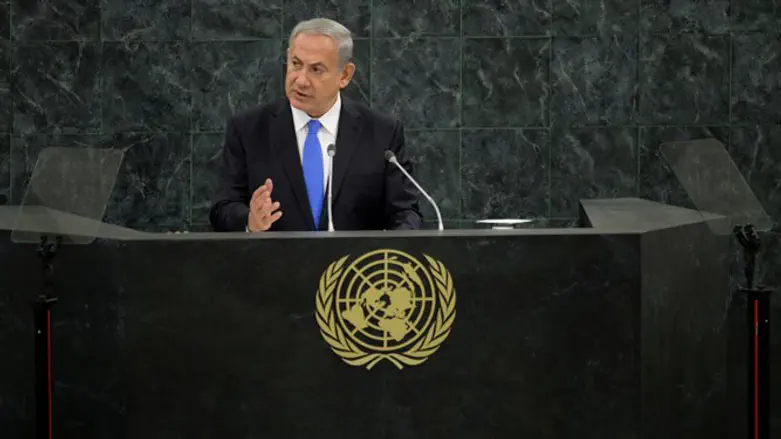
(JNS) Over recent days, foreign leaders, rulers and tyrants flocked to New York City for the 76th Session of the United Nations General Assembly, also known as UNGA. Did you listen to their speeches? I thought not. So, it occurred to me that I should provide you with the highlights.
Only I couldn’t find any. So instead, I will treat you to some lowlights—lies, evasions, boilerplate and insults to your intelligence.
Start with Xi Jinping, president of the People’s Republic of China, who pledged “to fight COVID-19 in solidarity” and “always put people and their lives first and care about the life value and dignity of every individual.”
Those nodding and/or applauding must know that Xi has blocked serious investigations into the origin and spread of the virus because such inquiries would build on the abundant evidence that Beijing, through incompetence or worse, let loose the global pandemic that has killed millions of people and devastated economies around the globe.
Xi’s propagandists have attempted to convince the credulous that the altered virus came from somewhere else—like, hey, maybe America! Or Australia! Nevertheless, Xi wants you to know he “stands firmly opposed to political maneuvering in whatever form.”
Let’s move on to Sergey Lavrov, foreign minister of Russia, which has sliced territory from neighboring Georgia and Ukraine while helping Syrian dictator Bashar al-Assad slaughter hundreds of thousands of his subjects. He assured us that “threats and challenges can be countered effectively only through concerted efforts in strict compliance with the universally recognized norms of the international law, first and foremost, the goals and principles of the U.N. Charter.”
It’s widely believed that the Kremlin has used chemical weapons to eliminate critics. Lavrov’s solution: “We are awaiting a response to the Russian initiative to elaborate a Convention for the Suppression of Acts of Chemical and Biological Terrorism.”
He’s dismayed, also, that “a number of countries” are attempting to “weaken” what he termed “the U.N.-centric world order.” America’s “hasty withdrawal from Afghanistan,” he added, should be regarded as “a further demonstration of the rules the West is going to build its world order on.”
Picking up on that theme, the new president of the Islamic Republic of Iran, Ebrahim Raisi, whose involvement in the mass execution of dissidents in the 1980s earned him the nickname “Butcher of Tehran,” gleefully pointed out that “today, the U.S. does not get to exit Iraq and Afghanistan but is expelled.”
He made clear that his regime has as little regard for President Biden as it did for President Trump: “Today, the world doesn’t care about ‘America First’ or ‘America is Back.’”
Ambassador Kim Song, the spokesman for the dynastic dictatorship in North Korea, took issue with President Biden’s claim to have terminated America’s longest war. “The reality,” he said, is “that the Korean War has not ended for over 70 years.”
He’s correct. America neither won nor ended that conflict. Instead, in 1953, we settled for a stalemate. Since then, we have maintained a presence in the South—currently about 28,000 troops—tasked with ensuring that the Beijing-allied dictatorship does not overrun the peninsula.
For decades, South Korea suffered from dreadful governance. Over time, however, it became increasingly democratic, free and prosperous. Afghanistan might have followed a similar path—with the Taliban prevented from re-conquering the country—had American leaders not decided that maintaining a much smaller military presence in that country was an unbearable burden.
This brings us to President Biden who, in his address to UNGA, insisted that unconditionally surrendering to the terrorist organization that hosted Al-Qaeda on Sept. 11, 2001, and which remains Al-Qaeda’s strategic partner, closed “a period of relentless war”—notwithstanding statements to the contrary made under oath to Congress by his top military advisers.
He boasted that he had opened “a new era of relentless diplomacy”—whatever that might mean. He said he has “prioritized rebuilding our alliances,” ignoring the fact that the French government, feeling slighted by him, had just days before withdrawn its ambassador to the United States for the first time ever.
He announced his intention to turn “our focus to the priorities and the regions of the world, like the Indo-Pacific.” When he came into office, the United States had one significant base in the Indo-Pacific: at Bagram in Afghanistan. He abandoned it.
He patted himself on the back for “re-engaging” with the World Health Organization and the U.N. Human Rights Council. Neither of those dysfunctional organizations has initiated any meaningful reforms.
While giving shout-outs to “proud Moldovans” and “the young people of Zambia,” he said not a word about Hong Kong, where longstanding freedoms have been erased by Beijing in violation of its treaty obligations. Nor did he mention Beijing’s escalating threats to the Taiwanese.
So, what was achieved at the 76th Session of UNGA?
I’d say nothing. To my surprise, two influential political commentators (who moonlight as comedians) appeared to agree. Jimmy Fallon said: “Next, the U.N. is gonna be, like, ‘We believe further conflict with the Taliban will be avoided thanks to our latest pinkie promise.’”
And Trevor Noah noted: “BTS gave a speech and filmed a music video from inside U.N. headquarters. Completely real. Yeah. Old people were probably watching this, like, ‘What the hell is a BTS?’ And young people were watching it, like, ‘What the hell is the U.N.?’”
Full disclosure: I’m one of those old people. But I’ve done my research, so I now know that BTS is a K-Pop sensation. If you don’t know what a “K-Pop sensation” is, you must be really old.
Clifford D. May is the founder and president of the Foundation for Defense of Democracies (FDD), and a columnist for “The Washington Times.”
This article was first published by “The Washington Times.”